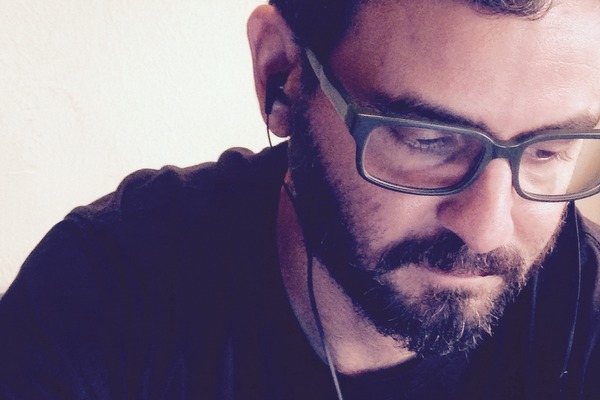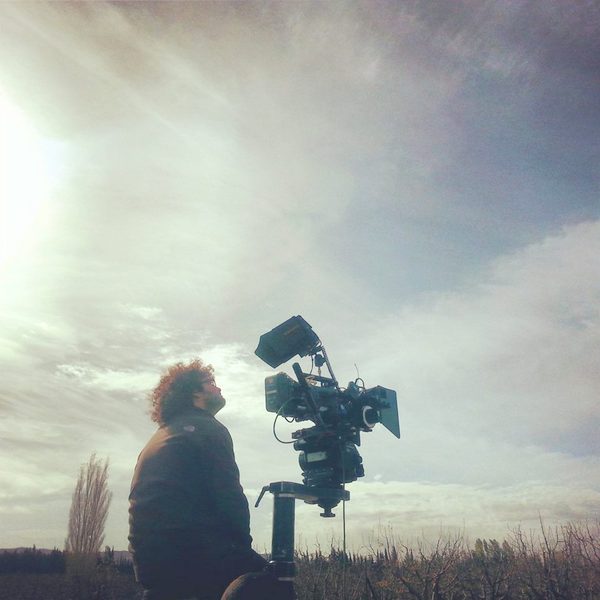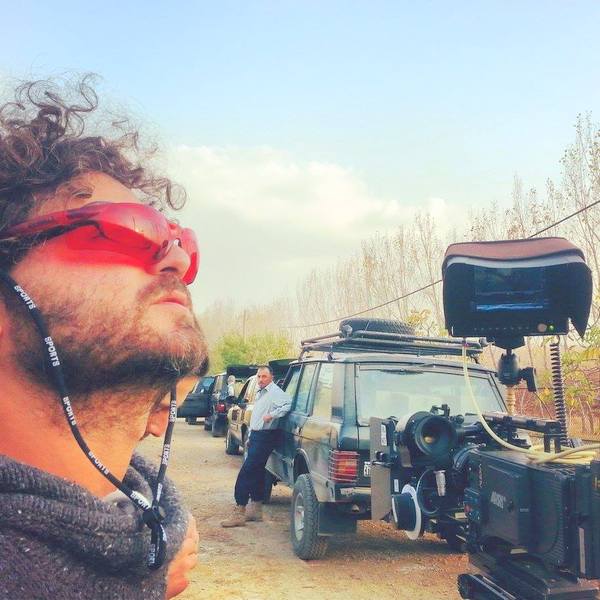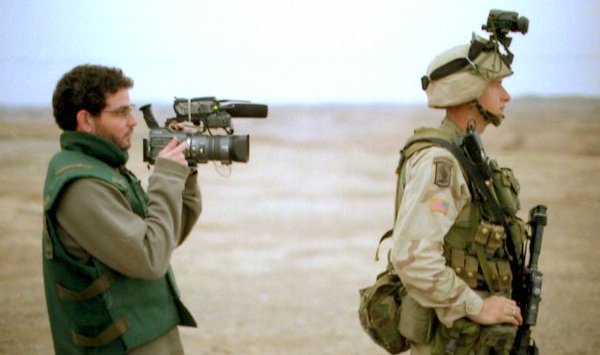
Bassem Fayad says that he has participated in the creation of some really good films and some really bad ones as well. Bassem likes to think that beauty is a natural flow of life energies, and thus the creation of images is somehow an active participation in the natural flow of life. “You do not create beauty, you only resonate with it.” says Bassem Fayad. “This process cannot be a process of thought; it’s rather a process of presence, a divine presence” says Bassem Fayad. Bassem Fayad loves working with people who acknowledge this fact, and this is his story and his quest through cinematography.
indieactivity: Did you study cinematography?
Bassem: I studied cinematography at Saint Joseph University of Beirut, but let me say that one does not graduate as director or cinematographer after 4 or 5 years of study, for me it’s a never-ending process of learning by doing, like life itself in a way.
Every time I stand behind a camera I’m learning to become a cinematographer, like a constant meditation. It’s important to remember that. I try to remind myself about this with every new project. Sometimes I forget but I try not to.
indieactivity: Tell us about your most recent project?
Bassem: currently I’m part of an ongoing documentary project with director Eliane El Raheb. I can’t say a lot about it at this stage but it’s definitely a very complex film, using documentary and fiction languages along with animation. It’s technically very challenging, especially when you have to keep in mind the very different esthetical approaches throughout the production, for a long period of time as the project evolves slowly.
It’s a film that dictates you what it really needs and you’ll have to find the right way to follow and evolve with it. A very low budget makes your job more difficult as you really need to get extremely creative technically and artistically.

indieactivity: How do you prepare for work on a new project?
Bassem: I need long conversations with the director not only about the project itself. I need to understand him/her, get to know him/her as a being (this is very important for me especially if the project is a documentary). This kind of interaction with a director takes a lot of time and requires people to interact with an open heart, which is not always possible but if it happens it brings magic to the process of filmmaking. I want a partnership, a full partnership.
When you don’t get that partnership you will most probably become nothing more than a technician. I’ve been a “technician” on so many films and I hated every moment of it! A partnership is very occasional, but when it presents itself I make myself ready to seize it. I’ve been very lucky to be part of some intense “ partnership” projects that made me evolve.
So what I do to prepare for a project is to seek that partnership and make it possible. All the artistic technical work comes on a 2nd degree of importance.
indieactivity: Who is your favourite cinematographer?
Bassem: I can’t say I have a favorite cinematographer! With every image I see I like to look for the person behind it, the creator. In cinematography, an Image is the product of so many persons, the cinematographer is only one of them, a very important person in the process of creating that image but he or she is definitely not the only one responsible for the creation.
We often tend to forget that fact. But anyway, I wouldn’t say I have a favorite cinematographer, I’d say I have a fascination in the process of “cinematography” itself. How was this image created and why, and how does it resonate with my state of being at this very specific moment in my life? That’s it really.

indieactivity: What is the difference between a cinematography and a DoP?
Bassem: Oh that’s a topic that has been long debated in the filmmaking community! There is no fair answer for this. A lot have been said about and around it. The community has come to agree that there is no difference, just two different titles for the same job. Personally I like to think about it the way Bresson once stated in French: “Le cinema puise dans un fond commun. Le cinematographe fait un voyage de découverte sur une planete inconnue”!
I think it’s more poetic this way. I prefer the job title “cinematographer” as I find it poetic, humane and not “so American” (smiles).
indieactivity: What brand of camera is your favourite?
Bassem: Sometimes a smart phone camera can do the job! It really depends on the nature of each project. Sometimes you need a very flexible set of equipment; sometimes you need to produce something epic (to serve the script not to show off). So it depends on so many factors.
I can say that I’m technically very comfortable working with Arri Alexa cameras but a “good” camera does not make a “good” film. I have used almost all available cameras, from smartphones to DSLRs to high-end cameras. It’s the way you use each camera that matters here.
indieactivity: What do you look for in a camera?
Bassem: There are a lot of factors to consider when answering such a question, it’s impossible to cover this topic in few lines but in short, when choosing a camera, I think every cinematographer will be examining few main points: Camera size and weight, Dynamic Range of sensor, sensor’s sensitivity to light, size of sensor, video Compression, video signal to noise ratio, signal analysis tools (waveforms etc.), monitoring tools, video Resolution, aspect ratio, and in regard to all this the right lenses.

Depending on the nature of a project a cinematographer might also look for built-in ND Filters, Ergonomics, quick access to menus and some other factors such as the size of data files, post production workflow and some other factors.
Choosing the right set of camera, lenses and monitoring tools is in itself a Science and a big gymnastic of the mind when you try to adapt your set of equipment to a low budget project, and unless you’re embarking on a commercial film you’ll have to learn this particular form of gymnastics .
indieactivity: How do you like to work with your camera crew?
Bassem: In short, just like my partnership with the director, I need every crewmember to be my partner. It would be very preferable if they all read the script and get emotionally and artistically involved. The focus puller (1st Ac) must be able to read my mind especially when there is some improvisation work happening.
That’s why I try to work with the same crew when it is possible. A certain degree of synchronization is what makes a crew a good effective crew. Synchronization is a state that needs to be nurtured with time.
indieactivity: Is there s science behind what you do?
Bassem: Oh yes, definitely.
Electronic, electrical, optical, geometrical and chemical sciences etc. are naturally involved.
But in addition to the above, from my experience, I assure you that a cinematographer will gradually become a sociologist, psychologist, psychotherapist, nutritionist, and meditator, massage expert, and sleep disorder specialist! All this knowledge will come to his rescue one day or another .
I would however add that I try to always use my camera as a tool of meditation, as a window to get into a state of “union” with the scene, the moment, the act. I experienced this state the first time while shooting a scene in the streets of Cairo. I know now that my camera took me to a different state of observation, something like a judgment free presence.
This is the science I’m trying to understand and use since that moment in Cairo, the science of meditation, through a camera perhaps.
indieactivity: Describe the gear you will use on a big-budget production?
Bassem: In Short, a low budget film requires a lot of adaptation skills and flexibility and probably some concessions. Sometimes one would even adapt his script to fit a given limited budget. I’ve played this game a lot, I find it challenging and requires a certain amount of surrender sometimes.
It involves some fun and some nerve breaking stress as well. Most of the time, making a film involves the art of making the right concessions on so many levels, not only in cinematography.
For a big budget film, all is made available. I’ve never shot a big budget film before but I can imagine the freedom of choice a cinematographer would have in such a situation.
indieactivity: What do you want most from a director?
Bassem: His or her being, partnership.
indieactivity: What do you want most from an actor?
Bassem: His or her total surrender.
indieactivity: What advice will you give DoPs around the world?
Bassem: Remember the storytelling and fight to get enough sleep! Seriously. It has been a never-ending learning by doing process and I want it to become a constant meditation. I think all careers should walk this path.
Follow Bassem Fayad on Social Media
Website
IMDB
Facebook
Twitter
Vimeo
MOEDER Oscar® Qualified Drama Based on MH17 Airline Disaster
OSCAR® Qualified MOEDER tells a story tragedy on the Ukrainian-Russian border
Nate & John Oscar® qualified Animation Short Directed by Jumai Yusuf
NATE & JOHN heartwarming animation short qualifies for the 97th Academy® Awards
Dreama Team by Chad Weber & Steve Vanderheide Acquired by Freestyle for November Release
Feature Documentary Dreama Walton Sets Digital Debut for Global VOD Platforms and on DVD on Nov 1, 2024
LGBTQ+ Film, “Muscat” by Philippe Grenier Qualified the Oscars®
Muscat is an audacious exploration of a young boy confronted with the discovery of his identity
Joy of Horses by Ava Justin acquired by BMG Global
Joy of Horses by Ava Justin, now available across digital streaming platforms
Vanessa Valente Talks Reality TV, Online Bullying and Healing on Sisters Uncensored Podcast
The Temptation Island’s reality TV star joins Sisters Uncensored Podcast October 16th
Oscar® qualifying Sunflower: A story of resilience in a war-torn country
Mateusz Balcerek’s Oscar® qualifying Sunflower is an extraordinary story of resilience in a war-torn country
more









